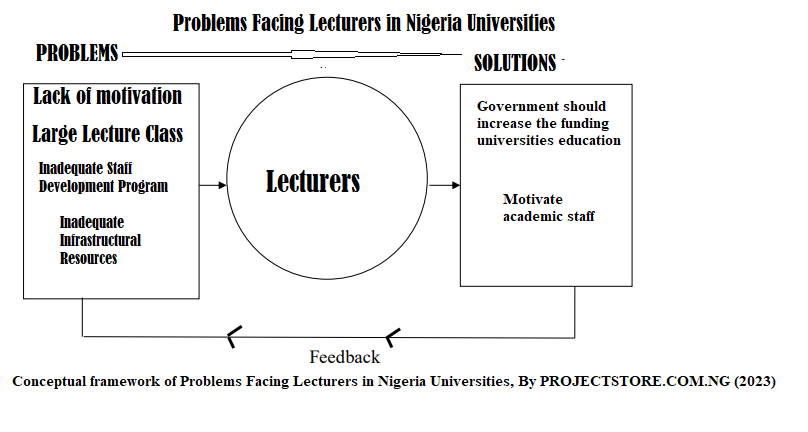Lecturers in Nigeria face a variety of difficulties, including as low motivation, teaching huge classes, a lackluster staff development program, insufficient infrastructure, strike actions, insecurity, little computer literacy, and limited financing for research.
1. Lack of motivation
It is possible to think of motivation as the driving factor behind people’s actions. It is thought that motivation is what drives people to start specific tasks, stick with them through to completion, and bring them to a successful conclusion. Mullins (2007) defined motivation as the direction and perseverance of people’s behaviors across time, even in the face of difficulties. Lesson instructors lack motivation. Salaries and other perks related to refrigerators are not paid on schedule. Numerous things go with motivation. An environment that is conducive to work is one of the things that motivates employees to perform successfully. Handy (1997), referenced by Anna (2017), emphasized that having a comfortable workplace will help employees do a good job at their employment.
2. Large Lecture Class
The educational technique known as class size can be used to calculate the average number of students in a class. The number of students that the instructor who manages the classroom should be able to successfully handle, supervise, and teach at any given time. According to Alechenu (2012), the National Universities Commission Benchmark Minimum Academic Standards (BMAS) of 2007 required the following teacher-to-student ratios for Nigerian universities: 1:20 for sciences, 1:15 for engineering and technology, 1:10 for medicine, veterinary medicine, and pharmacy, 1:15 for agricultural and environmental sciences, and 1:30 for humanities, management science, social sciences, law, and the arts. Although the standard based on carrying capacity provides these teaching staff to student ratios, many universities do not use them.
3. Inadequate Staff Development Program
The majority of professors also struggle with a lack of capacity development. Universities in Nigeria deny many teachers access to funding for professional development. Basil, Felix, and Eno (2013) state that capacity building initiatives have been recognized as crucial elements in Nigerian universities, leading to their positions as significant predictors of professors’ professional advancement. Participation in the programs by lecturers increases the success of capacity building in universities in addition to providing them with pedagogical and topic expertise. It changes the role-performance talents and skills of lecturers in order for them to successfully satisfy the demands of their employment.
4. Inadequate Infrastructural Resources
A serious problem lecturers deal with is a lack of suitable infrastructure. Infrastructure is a form of social capital that supports the delivery of academic services like teaching and research in educational institutions. Infrastructure facilities include things like offices, lecture halls, classrooms, sports fields, water, decent roads, and ICT facilities. Due to poor infrastructure facilities in the numerous universities throughout the nation, a large portion of academic and non-academic personnel in Nigerian universities lack offices to successfully carry out their academic duties. While many academic staff members share offices or don’t even have any, non-teaching staff members sometimes sit outside or migrate from one office to another because they don’t have a place of their own to work. Numerous academic employees do.
5. Striking Actions
The operations of lecturers are also hampered by strikes by various union groups in Nigerian universities. When the NASU or ASUU go on strike, a large portion of the academic staff is unable to work or fulfill their duties. Academic staff’s teaching and research programs are impacted by strikes. Academic programs became disrupted as a result of strikes. According to Okoli, Ogbondah, and Ewor (2016), it is now widely known that academic and non-academic staff unions from various institutions frequently engage in industrial actions against students at different universities around Nigeria. The failure of the government and unions to implement the agreement made frequently results in deadlock, which typically disrupts the academic calendar. As there is a temporary halt to academic activities.
6. Inadequate research program
Conducting research is one of the academic staff’s fundamental programs and primary duties. While academics are renowned for conducting research often throughout the world, it is regrettable that many Nigerian universities lack the necessary infrastructure and money for their academic staff to conduct research. This is supported by Okoli, Ogbondah, and Ewor (2016), who noted that governments have a poor attitude toward research and provide insufficient money for research initiatives. Mercy (2001) also made note of the fact that research has not received the priority it should in Nigerian universities. One of the duties of universities is to carry out research projects and address the nation’s social, economic, and political problems.
Way Forward
To address these issues, this article suggests that the government increase funding for university education, increase funding for research programs, motivate academic staff, provide effective staff development programs, provide more infrastructural facilities, implement union agreements, provide adequate security, and implement an ICT capacity development program.
Download Full Material-N5000
